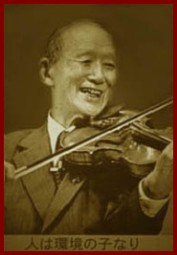suzukipianoschool
Pedagogical Philosophy
Inglés > The Suzuki Method

1. Shinichi Suzuki´s Pedagogical Philosophy, is based in the deep certainty that all children can learn well all that which istaugt to them, if they are educated in the correct way. Therefore, to educate children with this philosophy, requires onbehalf of adults in charge of them an attitude of CONFIDENCE and ENGAGEMENT before the inmense potentiality that all child brings at the time of birth
2. An adequate Environment is determining for the child to develop its abilities. Music must be in the environment, in thesame way as mother tongue is when it is learnt.
3. Father/Mother are the principal responsibles for their children´s education. They have the important mission of creating an adequate environment for them, giving them LOVE and ENCOURAGEMENT, necessary for them to grow and develop as noble and satisfied human beings.
4. A teacher who uses the Method and Suzuki Philosophy takes on a double compromiso: to educate a person through music, raising self esteem and templing character, and educating the musical abilities, emphasizing the development of hearing, memory and concentration
5. To reach the aims the teacher desires, he needs to have the permanent support of the child´s Family. For this reason a triangle is created of learning and interaction made up by parents, children and teachers known as the Suzuki Triangle.
6. MOTIVATION AND ENCOURAGEMENT are fundamental for all learning to be a success. That is why it is necessary to encourage children, because sincere praise generates enthusiasm, whereas criticism may cause rejection.
7. It is necessary to develop musical ability from an early age. In this way, children learn music as if it were another language, becoming a natural and essential part of their lives.
8. To create an environment which may favour the development of musical ability, it is necessary to listen to music of high quality daily. A "musical" ear is developed in this way.
9. It is necessary to respect the internal rhythm of each child. It is not good to compare children, because as people are different they have characteristics and times which belong to them. It is important to be sure that with endevour and dedication all can reach the proposed targets.
10. The learning of music is done step by step and with much repetition. The abilities are developed gradually and progressively, dominating one step completely before going on to the next. Repetition of each step is carried out with aclear approach and not mechanically.
11. Children learn from one another. Contact with other children is very profitable for them. For this, it is necessary that apart from their individual lesson, they periodically attend group lessons and concerts.
12. Children first learn to play the instrument. Once they have developed their ear and have acquired certain fluency in the performance, they learn to read music. This is similar to what occurs with the learning of the mother tongue, because children listen to their language and they speak it during a considerable time before they learn to read and write
13. Shinichi Suzuki´s most important ideal was to create a better world through music. His aim was not only to develop his students musical abilities but to develop human beings with a beautiful heart.